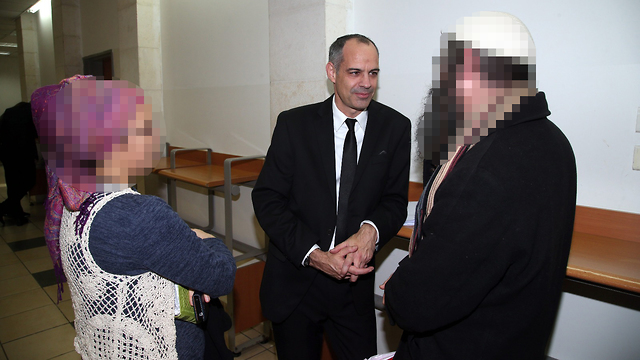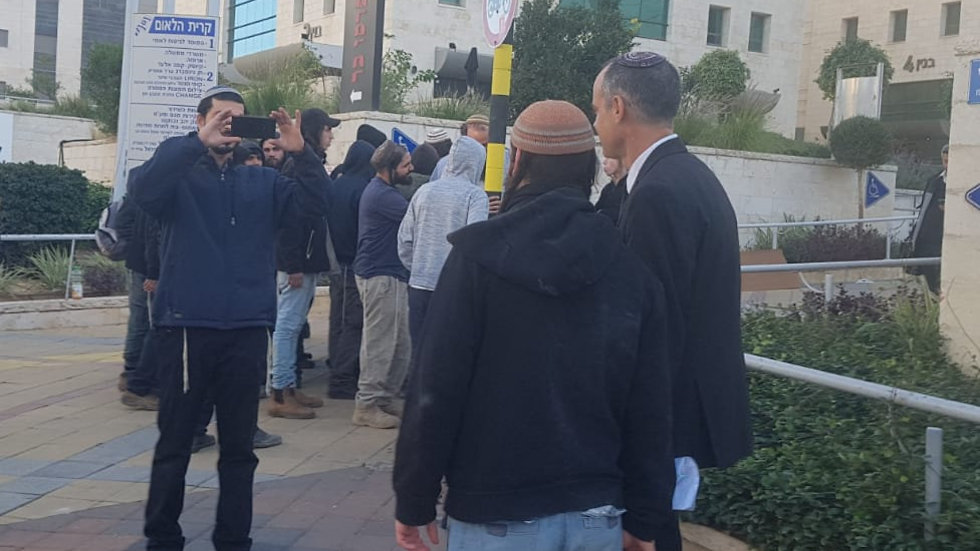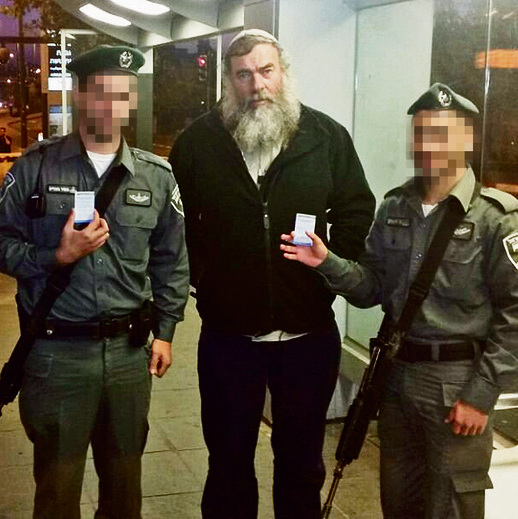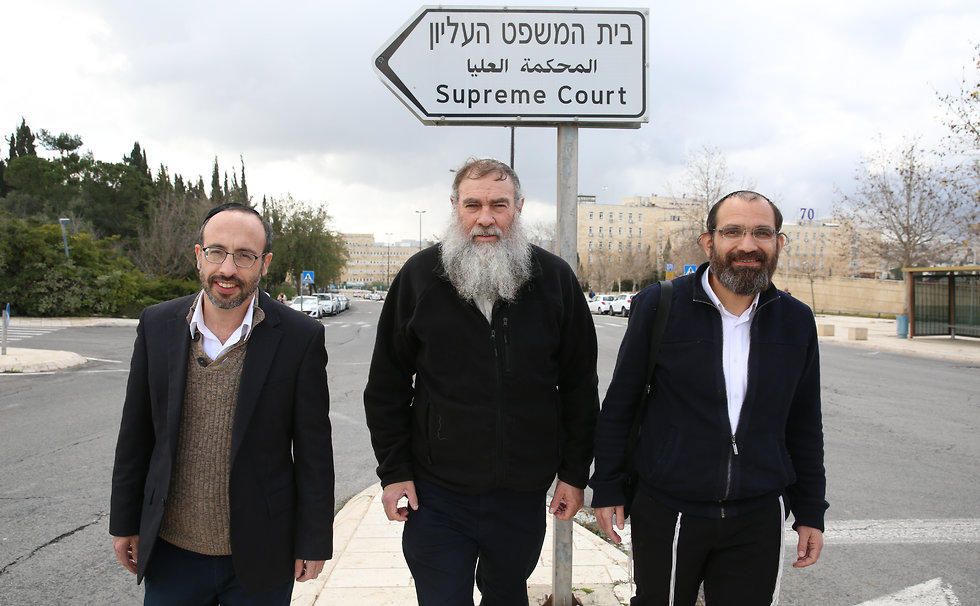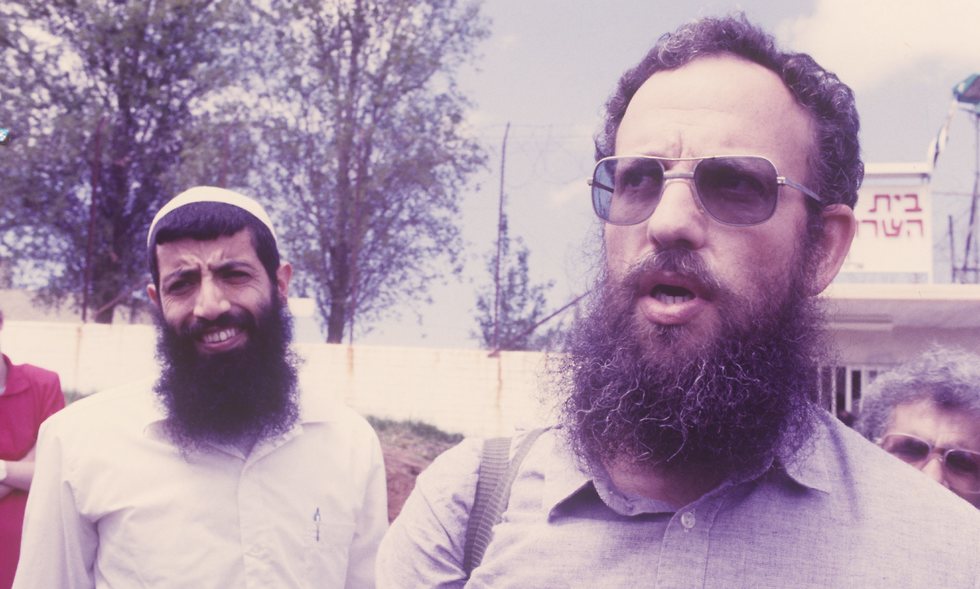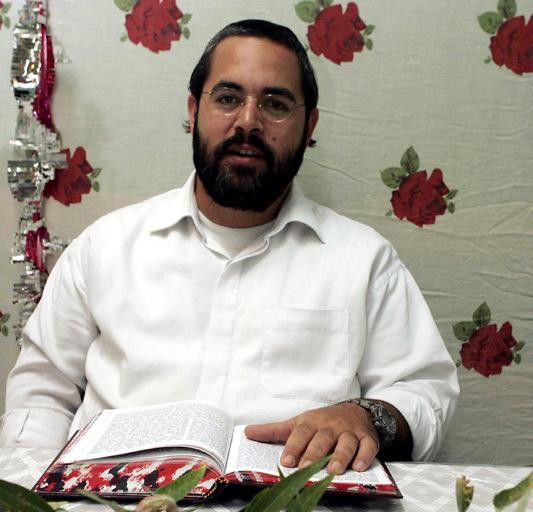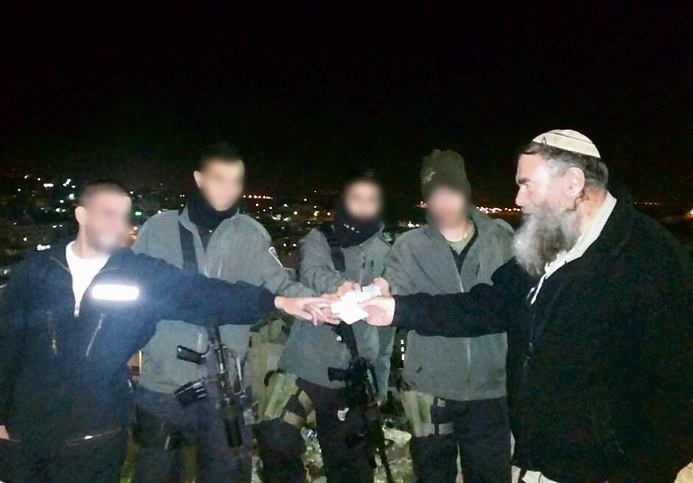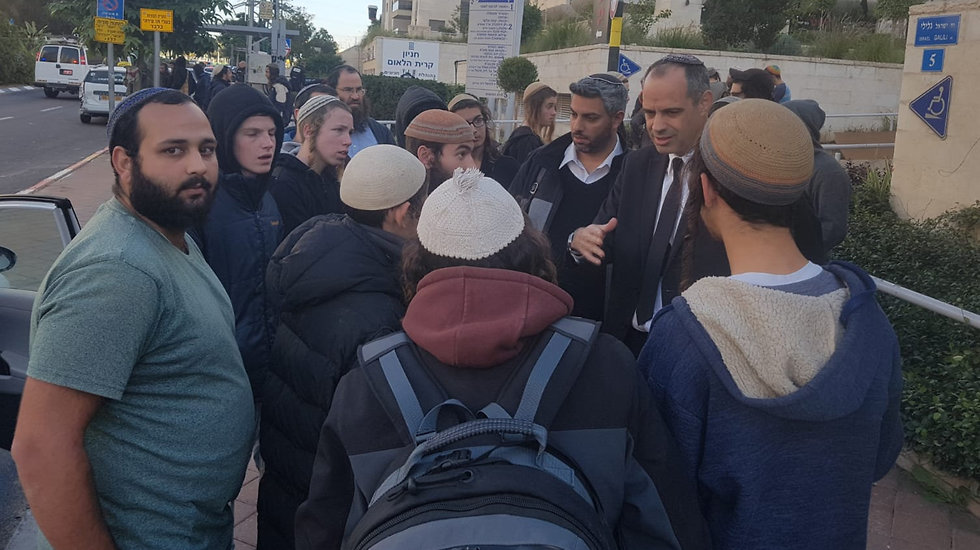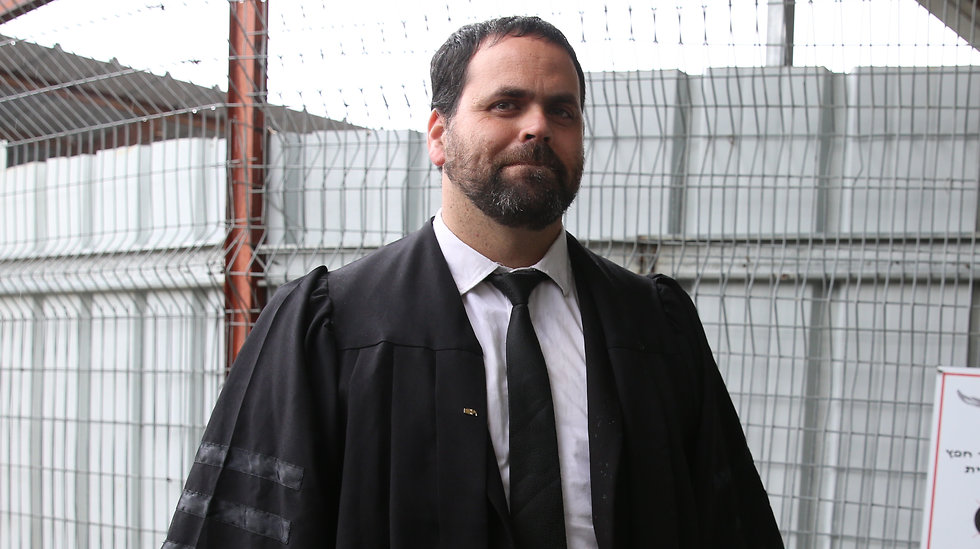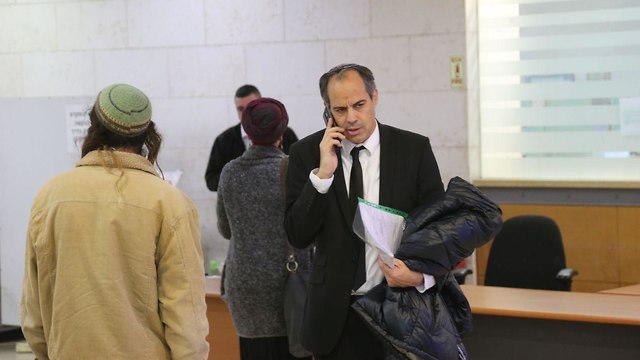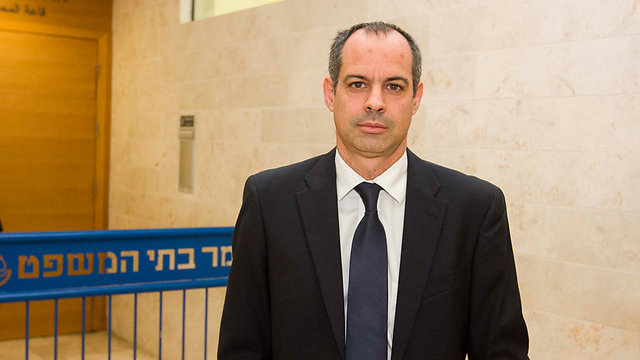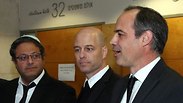

Honenu: The legal arm of Israel's radical settlers
Once a small NGO, the organization is now one of the main weapons in the arsenal of West Bank settlers. It goes head-to-head with the Shin Bet, represents 'price tag' suspects in court, hands out calling cards to soldiers in case they're charged with violence against Arabs, and in the past even provided financial support to families of Jewish terrorists, including Yitzhak Rabin's killer Yigal Amir.
After T.'s remand extension hearing ended, attorney Adi Keidar went out on the street outside the Rishon LeZion Magistrate's Court and was immediately surrounded by dozens of teens. T., the minor from Pri Haaretz yeshiva, which is in the settlement of Rehelim in the West Bank, has been charged with manslaughter as an act of terror over the death of Aisha al-Rawbi.
The Palestinian mother of eight was killed four months ago when her car was pelted with rocks while she was traveling near the settlement with her husband and daughter. Almost all of the students at the yeshiva were questioned by the Shin Bet, and eventually an indictment was filed against T., whose DNA was found on the rock that hit al-Rawbi's car.
The teens gathering around Keidar, all wearing the religious-Zionist sector's knitted kippahs, came down the hills of the West Bank to show their support for T. Some of them went to the same yeshiva as the suspected minor and were questioned themselves. They bombarded Keidar with legal questions, asked for his assessment on their friend's chances of avoiding conviction, and even demanded a selfie. Another youth, himself under investigation on suspicion of committing "price tag" vandalism (targeting Palestinians or Arabs following government activity deemed unfavorable) at a Palestinian village, was hounding Keidar for answers.
The admiration Keidar enjoys among those who are called the "Hilltop Youth"—many of whom are intimately familiar with the Shin Bet's interrogation rooms—is a testament to his status. If rabbis at yeshivas are the top religious authority for these youths, Keidar is the legal authority. He is the one that when the time comes will help them survive the Shin Bet and police and later save them from indictments filed against them.
Keidar is the legal advisor of the NGO Honenu. Even his opponents will admit he is a brilliant lawyer who gives prosecutors and the Shin Bet quite a headache. The NGO, which was founded in Hebron in 2002, provides free legal aid to suspects in Jewish terrorism and "price tag" cases, among other things. As such, the NGO has become—at least in the media—the mother base of the Hilltop Youth, so named for young settlers who live in unauthorized outposts in the West Bank.
In the past, Honenu also supported the families of Jewish prisoners who were convicted of murder, including Yigal Amir, who murdered prime minister Yitzhak Rabin, and Ami Popper, who was convicted in the murder of seven Palestinians.
All of this doesn't stop the NGO from defining itself as an organization that "advocates for human rights, ensuring suspects and prisoners' rights are not violated, and aids them in facing the aggressive system of law enforcement."
And indeed, Honenu has had many legal victories, helping to release suspects from police and Shin Bet custody. Only recently, Keidar, who along with Zion Amir represents the defendants in the Dawabshe family murder in the Palestinian village of Duma, reaped a significant achievement in the case: the court threw out a confession by one of the defendants on the grounds that it was extracted by unlawful means and under duress, or as Keidar calls it—torture.
But Honenu, which makes NIS 5 million a year in profits and employs only 10 people, has far-reaching influence, which extends beyond the legal field. Its members, who have ties to politicians on the right side of the political map, have been serving in recent years as the loudest mouthpiece for the most extreme settlers.
Meanwhile, the NGO has become one of the biggest headaches for the Shin Bet, which three weeks ago even released an unusually scathing statement condemning it.
So how did Honenu go from a modest legal NGO to an engine of settlement in the West Bank?
![]()
![]()
![]()
Honenu's business cards are all over the different Israeli communities and outposts in the West Bank. The cards read: "Have you been arrested? Call our organization's legal center." The cards, which are distributed, inter alia, during protests against the evacuation of settlements, are at the ready in the pockets of many settlers. In many cases, the first phone call a Jewish suspect in the West Bank makes is to the number at the bottom of those cards.
Since its establishment, Honenu has been de facto taking the same side of every legal dispute. The organization supports terror suspects (like in the Duma and the al-Rawbi cases), helps teenagers arrested after committing "price tag" vandalism, and defends every soldier or Border Policeman who committed an offense while on duty in the territories.
Among other things, Honenu helps detainees who protested against pride parades, and volunteers to aid Jewish officials in struggles waged in mixed Jewish-Arab cities. As such, the NGO is constantly accused of being a racist and homophobic organization that has no qualms about supporting even murderers to promote its agenda at the expense of human rights and the rule of law.
"I identify with the motives of those we support, even if I don't agree with their actions," says Shmuel Meidad, the CEO. "Honenu helps because it understands there is an insane reality here."
We meet with Meidad, 58, and Keidar in the latter's Ramat Gan office, which is filled to the rafters with thick binders with materials about the Duma trial.
Meidad's personal story is to a large extent the story of Jewish settlement in the West Bank. He comes from a religious family, a native of Moshav Tkuma in the Negev desert, who studied with Rabbi Haim Drukman as a youth and was captivated by the charm of the settlements.
"The settler zeal stuck to me," he says. "As a teenager, I was in Sebastia (a Palestinian village in the Nablus area), an activist in (the settler movement) Gush Emunim."
After his discharge from the IDF's Armored Corps, Meidad started studying at a Hesder yeshiva (which combines advanced Talmudic studies with IDF service) in Kiryat Arba, and over the past 36 years he has been living in the Jewish settlement, on the outskirts of Hebron.
Meidad used to run a transportation service, but his life took a different direction in 1984. At the time, members of the Jewish Underground were arrested after a long investigation by the Shin Bet. Three of the suspects—Menachem Livni, considered the leader, Shaul Nir and Uzi Sharbaf—were Meidad's neighbors in Hebron. "These are my closest friends," he now says.
During the trial, Meidad took care of the families of the suspects and showed up to court hearings to support them. The fact they were charged with the murder of three students at the Islamic College in Hebron, the attempted assassinations of Palestinian mayors, and planning terror attacks on Arab buses in East Jerusalem—didn't bother him.
After they were convicted, Meidad joined Rabbi Yehuda Hazani who led the campaign to pardon them. The campaign succeeded, and Meidad's three good friends, who were all jailed for life, were released after serving only a few years in prison.
There—in the realization that a public campaign could help settlers with legal woes—is where the seed for the Honenu NGO was planted.
For years, Meidad continued working hard to assist Jewish suspects in the territories, privately and on a voluntary basis. But in 1998, his friend Dov Dribben was killed during a clash with Palestinian shepherds on his Maon farm. The Palestinians, who snatched the weapon of Dribben's friend Yehoshafat Tor, shot Dribben dead and seriously wounded Tor.
"In those years, all kinds of hostile organizations started coming to our area and harassing settlers and soldiers," Meidad says. When he talks about "hostile organizations," Meidad means groups like Rabbis for Human Rights and B'Tselem. "Their activity led to legal moves against settlers, which resulted in people thinking twice before acting. In Dov Dribben and Yehoshafat Tor's case, the fraction of a second in which they hesitated to shoot ended up being critical. After this incident, I realized war was no longer something done with swords and rifles, it entails a lot of psychological, media and legal measures."
In 2002, Meidad founded an NGO that would later go on to become Honenu. The organization's founders were mostly residents of the Jewish settlement in Hebron, and some of its meetings are still held in the contentious Beit Hadassah in the city. Its founding document lists the NGO's objectives as: "help, support and the economic, spiritual and mental rehabilitation of prisoners, detainees and their families," as well as "legal counsel for soldiers and civilians who encountered hardships or fallen captive due to the security situation." Meidad was appointed the NGO's CEO and remains in the role to this day.
![]()
![]()
![]()
Economically, Honenu is a roaring success. In its first years, the NGO only raised NIS 190,000 in donations, but in 2005 it raised NIS 2 million. In 2015, Honenu's fund-raising went through the roof, and over the past four years the NGO has been raking in at least NIS 4 million in donations every year.
According to Meidad, Honenu's donors are "the people of Israel." These days, the NGO has a call center to raise money in Israel and a crowdfunding campaign online. In the past, it raised money through telemarketing as well.
Early on, however, about half of the NGO's budget came from donations from the United States. According to Meidad, nowadays only a small portion of the donations the NGO receives come from abroad.
Do you have a fundraising apparatus in the US?
"We don't have an apparatus, but we do offer the option of donating there. There's a volunteer who takes in the donations and passes it on to us, but it's relatively small change. Tens of thousands of dollars, maybe."
But that is inaccurate. A review of the NGO's financing records shows that in its early years, about half of Honenu's donations came from the United States, including through its American branch Honenu USA. Starting in 2010, the NGO has been receiving hundreds of thousands of shekels in donations from the Jewish-American Marcus family, the founders of the Central Fund of Israel, which also donates to the right-wing NGO Im Tirtzu and settlements like Itamar and Beit El.
In 2015 alone, Honenu received NIS 1.135 million from the American fund. The same year, the NGO received NIS 126,000 from Access Credit, a Jerusalem-based company that specializes in wire transfers and check cashing. Not exactly "the people of Israel."
In 2016, the donations from the US dropped after Haaretz published a story revealing that some of the NGO's funds go to aid the families of Jews convicted of murder. A review of Honenu's records reveals a surprising list of beneficiaries who received thousands of shekels from the NGO in 2015: the family of Ami Popper, convicted of killing seven Palestinians, received NIS 3,500; Shahar Butbika, a Border Policeman convicted of killing an Arab teenager by throwing him off his jeep in 2002, received NIS 3,500 as well; the family of Yaakov "Jack" Teitel, who was convicted of killing two Palestinians in 2009, received NIS 6,000; the family of former MK Orit Strook, whose son Zvi was convicted of abusing a Palestinian boy, received NIS 14,000; Matityahu Shabo, who was arrested in 2003 and convicted of possession of explosives, received NIS 17,000; families of members of the Bat Ayin Underground, who were suspected of numerous acts of terrorism against Arabs, received NIS 20,000. In the past, the NGO also transferred funds to the family of Rabin's assassin Yigal Amir.
"There was something like that happening in the past," Meidad admits, "today, in general, not anymore."
It is important to note, however, that the organization's biggest grant in 2015—NIS 35,000—was given to the Zelinger family from Elon Moreh, whose three-year-old daughter was diagnosed with cancer.
While it is unclear from the NGO's records whether these financial grants have indeed stopped, the NGO's heads claim these grants ended five years ago. Either way, Honenu's cash flow was unaffected, on the contrary. In 2016 the NGO raised almost NIS 5 million, with over half a million shekels coming from the US. Their main donor remains the American Marcus family, which donated over NIS 400,000 to the NGO that year. Another main donor was Libby Kahane, Rabbi Meir Kahane's widow, who donated NIS 100,000.
Conversely, Meidad makes a decent living from the NGO. In 2004, the NGO only had three people on the payroll, with Meidad himself making NIS 63,000 a year ($17,285 in today's exchange). Today, the NGO employs ten people, and in 2016 Meidad was already making an annual pay of NIS 262,000 ($71,880).
![]()
![]()
![]()
Most of Honenu's expenses—more than NIS 2 million a year—go toward legal aid. Keidar is in charge of this aspect of the organization. The 47-year-old Netanya native opened a criminal law firm 15 years ago. Keidar, who wears a small kippah and comes from a Revisionist Zionist home, first heard of Honenu in 2004. Up until that time, the NGO was operating under the radar. In 2005, Honenu made the national stage during the Gaza Disengagement.
"At the time, police arrested hundreds of people who were protesting against the disengagement and blocking roads," says Keidar.
Honenu's calling cards spread throughout the protests, with the NGO offering free legal counsel to detainees. Within a few days, the small NGO was fielding hundreds of calls from people seeking its help. Honenu's personnel worked diligently to pair up detainees with lawyers from across the courty to represent them in court hearings.
"From a handful of employees, we became an operation providing assistance to hundreds of people," says an official in the organization.
The service Honenu was offering filled a big hole in the market. After the 2005 Gaza disengagement, a rift was created between the settlers and the Israeli government. At the same time, more and more youths—including teenagers who dropped out of yeshivas—began erecting outposts on the hills of the West Bank.
"We see this as a national mission, but the government doesn't see it as important," Keidar says. "What happened in those years were clashes between the settlers and Arabs and security forces. It became the daily routine, while the government looked on. The result was that at the end of each of these clashes, the teens were the ones who found themselves under arrest or taken in for questioning."
These teens remain Honenu's main clientele to this day, as the NGO aides them in sabotaging the Israeli government's efforts to fight against the "price tag" vandalism and implement a freeze on settlement construction.
The NGO's busiest department is the one handling arrests, which operates a 24/7 hotline that takes in calls from detainees and their families and provides them with immediate legal assistance, free of charge, during the investigation and remand extension hearings.
"We have dozens of lawyers of all types of expertise," says Keidar, whose job also includes coordinating between the relevant lawyers and the detainees.
Another department follows up on cases after an indictment has been filed. While Honenu normally doesn't finance the legal counsel at this stage, its personnel do closely accompany the suspects. "At the moment, there are hundreds of cases we're accompanying," says Keidar, who himself is representing the suspects in the Duma case.
Among other things, the NGO also represents soldiers and Border Policemen under investigation by the Military Police's Criminal Investigation Division (CID) over incidents that happened while they were on duty. According to Honenu officials, high-ranked officers also turned to them for discreet legal counsel.
These days, Honenu's lawyers are defending several soldiers and Border Policemen in court. One such case is that of Border Policeman Ben Deri, who was convicted of causing death by negligence of a Palestinian rioter during Nakba Day clashes near the Beitunia checkpoint in Ramallah.
Another department of Honenu provides legal counsel to prisoners, ensures the Israel Prison Service doesn't violate their rights, and even provides financial aid to their families.
Honenu is particularly proud of a department that provides legal counsel to families who lost loved ones in terror attacks, helping them realize their rights. This department often works alongside the State Prosecutor's Office during trials of terrorists. It also represents non-Jewish Israeli citizens, such as a resident of Abu Ghosh who was wounded in an attack at Har Adar.
"Those who help the people of Israel, we help them," Meidad says. "We have the privilege of always being on the good guys' side."
Recently, Honenu helped the family of Yanai Weissman, who was murdered in a stabbing attack in the Sha’ar Binyamin industrial zone. Attorney Haim Bleicher represented the Weissman family as the victims of the crime during the trials of the terrorists who murdered Yanai.
Bleicher helps dozens of bereaved families. "The families turn to us, and we contact the military prosecution, arrange a joint meeting and get information about the cases that have to do with the attack," he says. "We think the most important thing is the presence at court. We physically accompany the victims to the courtroom. In some one the cases, I go alone because the families can't bear the grief. We make sure there are no lenient plea deals and provide counsel to families on how to fight such deals."
![]()
![]()
![]()
But Honenu's massive outreach goes far beyond the courtroom and penetrates deep into the political sphere. In addition to the legal counsel the organization provides its clients, it also wages, with their help, an orchestrated public relations campaign meant to make it hard on law enforcement authorities to solve cases of Jewish terrorism and "price tag" vandalism, or prosecute those involved. This PR campaign leans heavily on aggressive attacks against the Shin Bet.
Honenu was one of the architects of the campaign against the "torture" of Jewish suspects at the hands of the Shin Bet, which included quite a few mass protests. This campaign recently noted a victory when the court threw out some of the confessions in the Duma trial, thus legitimizing the Honenu lawyers' claims.
This is also the course of action the NGO took in the al-Rawbi murder case. When the investigation came to light and five suspects were arrested, Honenu organized demonstrations against the arrest outside the Shin Bet facility where they were being held. This campaign was accompanied by posts on social media reporting Honenu's recent legal success, and the NGO also helped the families of the detainees get a meeting with Justice Minister Ayelet Shaked, during which they detailed their grievances against the Shin Bet.
The Shin Bet hit back three weeks ago, releasing a statement criticizing the "deliberate and ongoing effort by many interest parties to slander the Shin Bet and its employees and delegitimize its activities."
Honenu may have not been mentioned by name in the Shin Bet statement, but they were certainly the main catalyst behind it. "Honenu is definitely causing damage to national security," says Dvir Kriv, a former handler in the Shin Bet's Non-Arab Affairs Department. "They don't understand that there is only one Shin Bet: the same one that interrogates a Hamas terrorist today could interrogate a Hilltop Youth tomorrow. This is the same organization with the same objective—preventing terrorism. Terrorism is terrorism, and it doesn't matter if the person who committed it is Jewish or Arab. Honenu's claim is that there is a unit in the Shin Bet that operates against the people of Israel—they call it the 'Jewish Department,' even though that's not its name—but this unit's agenda is the exact opposite."
According to Kriv, Honenu is waging a PR campaign against the Shin Bet, at the expense of some of the youths it represents in court, who did not commit the offenses. "They're doing this so it could help them with the problematic detainees, the ones who did commit terror acts," Kriv says. "A lawyer who knows his client is not guilty should tell him 'Give your version, provide an alibi, and go home.' In reality, they brief everyone to keep silent."
"I have no doubt they are inventing and spreading disinformation," Kriv says. "All of the stories about torture—making it seem like we are using inquisition methods—are an exaggeration. It's true that the court found a few irregularities and threw out some testimonies, but it just proves that the court is not a rubber stamp for the agency, like they're trying to claim."
"Our dispute with the Shin Bet is a judicial one," Keidar says in response. "We claim they are operating unlawfully. They investigate where there is no need to investigate, they operate where they shouldn't be, they turn every child who sprayed some graffiti into a terrorist. A few years ago, they changed direction and decided that if they started talking about 'price tag' as a terror attack and a Jewish defendant as a terrorist, it'll do something for the public. But while they're at it, they're trampling on human rights. The fact is that most of the cases were not solved, but they still arrested a ton of people and tortured people, some of whom were released without charges."
Aren't you shooting yourself in the foot? The Shin Bet is entrusted with protecting the settlers in the territories.
"So I am supposed to allow it to torture my client because in its essence it's supposed to thwart terror attacks? In the long term, we're working to educate the Shin Bet."
Addressing the claim Honenu is advising all of its clients to remain silent during questioning, Keidar says that "The right to remain silent is a legal right, mostly because when the Shin Bet interrogates you, there is no documentation of the interrogation (unlike police interrogation)."
Does the Shin Bet distort confessions?
"No, but the moment the law allows the Shin Bet interrogator not to document the detainee's own words, I as a lawyer find this unacceptable."
Even if the detainee has a great alibi?
"Yes."
![]()
![]()
![]()
The Shin Bet is not the only one in Honenu's crosshairs. Under a legal cover, Honenu is attacking the Netanyahu government, which the NGO says operates in an illegal and irresponsible manner. At the height of the campaign against the Shin Bet over the al-Rawbi case, Honenu was involved in a rally outside the Prime Minister's Residence in Jerusalem under the banner of "Mr. Prime Minister, settlers also have basic rights!" The rally ended in clashes with the police.
Honenu's efforts to influence the public agenda is led by its Public Relations Department, which is run by Eran Schwartz, who is on the NGO's payroll as its spokesman. Schwartz also owns a PR firm that has campaigned against the High Court of Justice's judicial activism, among other things. In recent years, and particularly after the Duma and al-Rawbi cases, the organization has been constantly making headlines, with Schwartz acting as spokesman and presenting Honenu's positions against the Shin Bet.
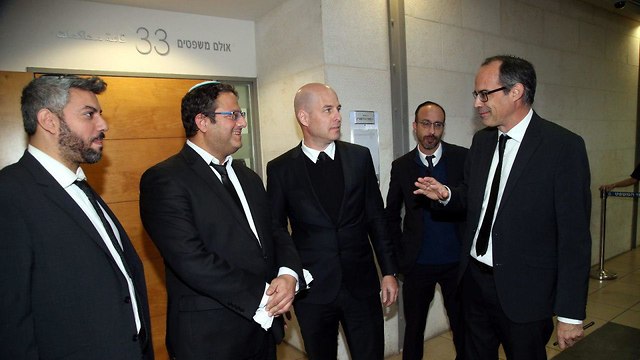
But officials in Honenu claim the PR that the NGO does is meant strictly to protect the legal rights of their clients. "We understand that daylight is purifying," a Honenu official says. "There are a lot of wrongs and illegal acts, which we don't see done to other sectors of the population or done in similar offenses; when it comes to us, there is over-eagerness to solve (the crime) and over-enforcement. They use tools that are not used anywhere else, and not speaking out about it allows it to happen. Just as the left wing organizations influenced law enforcement authorities against the settlers ... we learned to do the opposite."
Is there someone you wouldn't represent? For example, a Jew accused of a nationalistically motivated murder?
Keidar: "There is no such thing. Even a man who did something and confessed to it—our understanding is that he didn't wake up in the morning deciding he's going to kill Arabs. As a lawyer, even if I don't agree with someone, I understand he's not acting in a vaccum."
What do you think about "price tag" incidents?
"These are not violent incidents, but property offenses. At worst, this is an aggressive initiative that comes from a place of distress or helplessness, and at best it's the actions of an unruly child."
Don't you feel that you are justifying and encouraging violence?
"No, because we're a human rights organization, and everyone deserves representation."
On your crowdfunding page, which raises money for the fight against "judicial terrorism," you wrote: "We're here to have their back against the rule of law." Is the rule of law something bad?
"The state is conducting itself in a grave manner. My clients have been experiencing selective enforcement for 20 years; it is a form of abuse. It happens in the police, in the prosecution, in the State Prosecutor's Office—all the way up to State Prosecutor Shai Nitzan. If you don't have a body that could fight against these systems professionally, you will lose. This is what's behind this statement."
Are the courts also being selective?
"The courts also have a hard time dealing with our cases. They fear that decisions in favor of our clients will be used against them. After throwing out the confessions in the Duma trial and in the Acre detention facility story (where the court threw out the confession of a teen suspected of Jewish terrorism after his confession was collected by Shin Bet interrogators posing as prisoners), it's the first time you feel that the court is starting to understand, after 20 years, what we're talking about."














